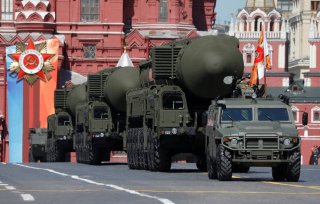Will Putin Wage Nuclear War Over Ukraine?
Vladimir Putin’s aggression against Ukraine reveals how important nuclear weapons are to Russian strategy.
Vladimir Putin’s aggression against Ukraine reveals how important nuclear weapons are to Russian strategy. Nuclear threats accompanied the crisis leading up to the war, the declaration of a “special military operation” (as Putin calls it), and continue to figure prominently in Putin and other Russian officials’ rhetoric. This is no accident; these threats directly reflect Putin’s Ukraine-hysteria. However, they also fully comport with Russian nuclear strategy. In 2014, despite no credible threat to Russia’s ongoing seizure of Crimea, Putin mulled the possibility of calling a nuclear alert. Consequently, Putin’s decision to allegedly raise the alert status of Russian nuclear weapons on February 27 may reflect his anger at Ukraine’s defiance of subsequent Russian military plans. The United States must grasp that Putin “bet the farm” by invading Ukraine and has risked Russia’s stability on the war’s outcome.
As James Sherr of the International Centre for Defense and Security in Tallinn, Estonia, told us, Putin’s war against Ukraine represents a wager on his regime’s survival, and Russia “reserves the right to use nuclear weapons when the very existence of the state is under threat.” The Putin regime is now under threat domestically and externally due to its aggression and visible mismanagement of this war. Consequently, the operative condition for nuclear use has now come into play. Although Russian doctrinal documents equate this threat with the opponent’s use of nuclear or conventional weapons, Russia’s 2014 defense doctrine emphasizes that Russia is mired in an ideological contest with the West expressed in the form of “rivalry of value orientations” as a “military danger” (one notch below a “threat”), and “the establishment of regimes [in contiguous states], whose policies threaten the interests of the Russian Federation.” Due to his hysteria regarding Ukraine, Putin could easily conclude that the time for nuclear threats and use has arrived. Here we should also emphasize the integrated employment of military force and political, economic, informational or other non-military measures implemented with a wide use of the “protest potential of the population and of special operations forces.” Since Ukraine embodies that description of contemporary war, nuclear weapons immediately become a valid coercive instrument for Russia.
Virtually everyone understands that Russia’s habitual nuclear threats aim to intimidate the West into inaction in response to the Russian military operations against Ukraine. At the same time, these threats also are intended to isolate the Ukrainian theater from any potential external support. Equally, if not more important, these threats also enable Moscow to win an unprovoked conventional war that it started but then severely mismanaged. Many analysts have argued that Moscow’s significant misjudgments have allowed Ukraine to play for time, and should Western support sustain Ukraine, Moscow could lose the war. Consequently, these nuclear threats are not solely or even necessarily the product of Putin’s alleged mental derangement. Rather the threats represent the logic behind Russia’s nuclear doctrine: it is intended to give Moscow the freedom of action to fight its wars on its terms despite its armed forces’ conventional inferiority.
Thus, Russia’s nuclear threats aim to ensure that Russia retains escalation dominance, which allows Moscow to control how the Ukraine crisis evolves over time. Hence, even if Moscow gets into trouble during the war, it can freely escalate with apparent impunity and retain the strategic initiative despite overall strategic inferiority. The unrestrained bombing of civilian targets and facilities associated with the nuclear reactor at Zaporizhzhia is the latest manifestation of a deliberate Russian strategy to brutally depopulate the theater and destroy the enemy for the effrontery of defending themselves against the Russian state.
Yet despite Russia’s strategy and seeming ability to act with impunity in Ukraine, it is in Washington and its allies’ moral and strategic interests to deny Putin any hope of victory by such means as an UN-approved no-fly zone (NFZ). While instituting a NFZ places military demands on the United States and NATO, it is unclear that an NFZ will inevitably trigger a nuclear war if those assets are emplaced by Ukraine—especially under a UN resolution. After all, Putin has actually done little to alter Moscow’s nuclear posture, although he has exercised their elements.
Yet failure to act inevitably raises the specter of further threats, including nuclear war, which counts on exploiting established fears of Armageddon. It also all but ensures a more significant humanitarian catastrophe. Ultimately, a government that willingly conducts deliberate yet indiscriminate, undisciplined, and even criminal attacks on hospitals, and it appears nuclear reactor facilities, and which regards its own solemn treaties with other states as mere scraps of paper cannot be allowed to continue its marauding attacks on European and international security. Putin has shown that he will only be deterred by superior force. It is long overdue that the United States and NATO act to defend not only Ukraine but also their own interests, values, and security. The heroic resistance of the Ukrainian people deserves such support.
Stephen Blank is a Senior Fellow at the Foreign Policy Research Institute.
Peter Huessy is a Senior Fellow at the Hudson Institute and a Visiting Senior Fellow at the Atlantic Council.
These views expressed above are their own.
Image: Reuters.

